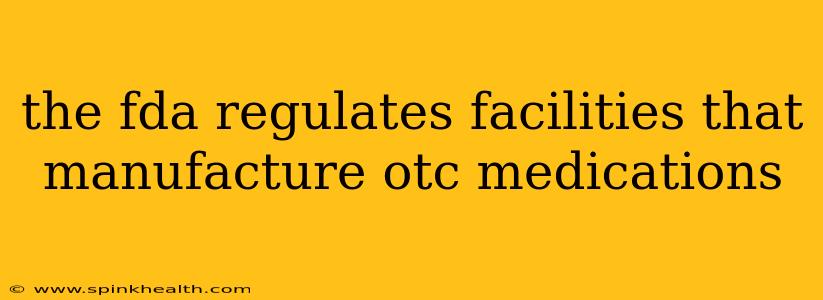The FDA's Role in Ensuring Safe Over-the-Counter Medications: A Behind-the-Scenes Look
The seemingly simple act of picking up a bottle of ibuprofen or allergy medicine at your local drugstore belies a complex regulatory process overseen by the Food and Drug Administration (FDA). The FDA doesn't just regulate the products themselves—it rigorously oversees the entire manufacturing process of over-the-counter (OTC) medications, ensuring the safety and efficacy that consumers rely on. This isn't just about checking labels; it's about ensuring clean facilities, qualified personnel, and consistent quality control from the initial ingredient sourcing to the final product on the shelf.
Let's delve into the world of FDA regulation for OTC medication manufacturing, exploring the key aspects that guarantee the safety and quality of these everyday essentials.
What specific aspects of OTC medication manufacturing does the FDA regulate?
The FDA's regulatory reach is extensive, encompassing every step of the manufacturing process. Think of it as a comprehensive quality control system designed to minimize risks and maximize safety. This includes:
-
Facility Registration and Inspections: Manufacturing facilities must register with the FDA and undergo periodic inspections. These inspections assess adherence to Good Manufacturing Practices (GMPs), a set of standards designed to ensure consistent product quality. Inspectors verify cleanliness, equipment maintenance, personnel training, and adherence to established procedures. Failure to meet GMPs can lead to warnings, recalls, and even facility closure.
-
Ingredient Sourcing and Testing: The FDA closely monitors the sourcing and testing of raw materials used in OTC medications. They ensure that ingredients are of appropriate quality and purity, free from contaminants that could compromise safety or efficacy. This includes rigorous testing procedures throughout the manufacturing process.
-
Manufacturing Processes and Quality Control: The FDA regulates the manufacturing processes themselves, ensuring that they are consistent and controlled. This involves monitoring equipment calibration, batch size control, and the implementation of robust quality control checks at each stage of production.
-
Packaging and Labeling: Accurate and informative labeling is crucial for consumer safety. The FDA mandates specific labeling requirements for OTC medications, ensuring that consumers have the necessary information to use the product safely and effectively. This includes clear instructions, warnings, and ingredient lists.
-
Adverse Event Reporting: The FDA has a robust system for monitoring adverse events (side effects) reported by consumers and healthcare professionals. This data helps identify potential safety issues and allows for prompt investigation and action, including product recalls if necessary.
How often does the FDA inspect OTC medication manufacturing facilities?
The frequency of FDA inspections varies depending on several factors, including the facility's history, the complexity of the products manufactured, and the risk level associated with the ingredients used. While there's no set schedule, facilities can expect regular inspections to ensure ongoing compliance with GMPs. The FDA prioritizes facilities with a history of non-compliance or those manufacturing higher-risk products.
What are the consequences of non-compliance with FDA regulations for OTC medication manufacturers?
Non-compliance can result in a range of consequences, from warning letters to facility closures. The severity of the consequences depends on the nature and extent of the violation. Possible actions include:
-
Warning Letters: A formal warning outlining the violations and outlining steps to rectify them.
-
Import Alerts: Preventing the import of products from non-compliant facilities.
-
Recalls: Removing products from the market due to safety concerns.
-
Civil Penalties: Financial penalties for violations.
-
Criminal Prosecution: In severe cases, manufacturers can face criminal charges.
The FDA's rigorous oversight of OTC medication manufacturing is a critical component in protecting public health. It ensures that the medications we rely on daily are safe, effective, and consistently meet high-quality standards. This unseen process plays a vital role in maintaining consumer trust and confidence in the pharmaceutical industry.

